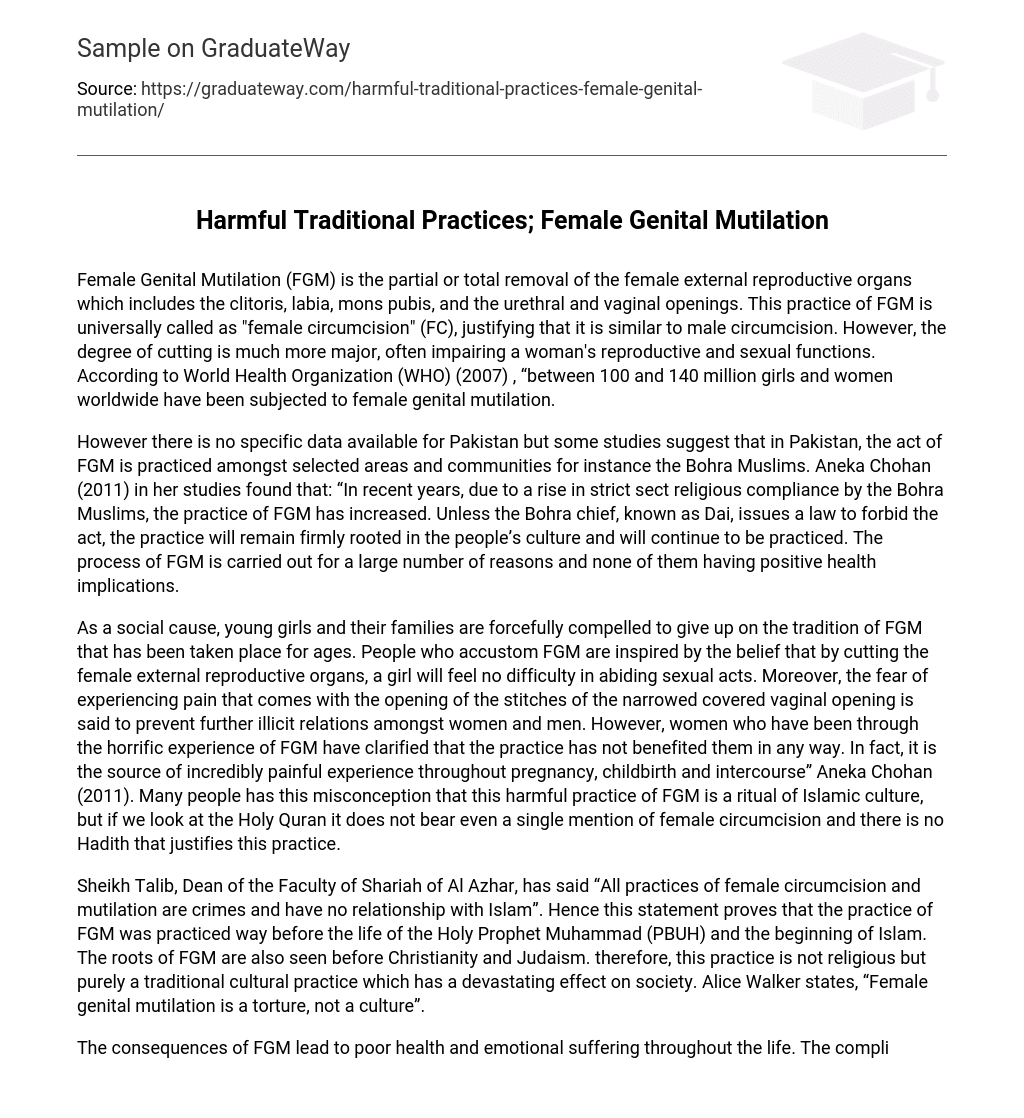Female Genital Mutilation (FGM) is the partial or total removal of the female external reproductive organs which includes the clitoris, labia, mons pubis, and the urethral and vaginal openings. This practice of FGM is universally called as “female circumcision” (FC), justifying that it is similar to male circumcision. However, the degree of cutting is much more major, often impairing a woman’s reproductive and sexual functions. According to World Health Organization (WHO) (2007) , “between 100 and 140 million girls and women worldwide have been subjected to female genital mutilation.
However there is no specific data available for Pakistan but some studies suggest that in Pakistan, the act of FGM is practiced amongst selected areas and communities for instance the Bohra Muslims. Aneka Chohan (2011) in her studies found that: “In recent years, due to a rise in strict sect religious compliance by the Bohra Muslims, the practice of FGM has increased. Unless the Bohra chief, known as Dai, issues a law to forbid the act, the practice will remain firmly rooted in the people’s culture and will continue to be practiced. The process of FGM is carried out for a large number of reasons and none of them having positive health implications.
As a social cause, young girls and their families are forcefully compelled to give up on the tradition of FGM that has been taken place for ages. People who accustom FGM are inspired by the belief that by cutting the female external reproductive organs, a girl will feel no difficulty in abiding sexual acts. Moreover, the fear of experiencing pain that comes with the opening of the stitches of the narrowed covered vaginal opening is said to prevent further illicit relations amongst women and men. However, women who have been through the horrific experience of FGM have clarified that the practice has not benefited them in any way. In fact, it is the source of incredibly painful experience throughout pregnancy, childbirth and intercourse” Aneka Chohan (2011). Many people has this misconception that this harmful practice of FGM is a ritual of Islamic culture, but if we look at the Holy Quran it does not bear even a single mention of female circumcision and there is no Hadith that justifies this practice.
Sheikh Talib, Dean of the Faculty of Shariah of Al Azhar, has said “All practices of female circumcision and mutilation are crimes and have no relationship with Islam”. Hence this statement proves that the practice of FGM was practiced way before the life of the Holy Prophet Muhammad (PBUH) and the beginning of Islam. The roots of FGM are also seen before Christianity and Judaism. therefore, this practice is not religious but purely a traditional cultural practice which has a devastating effect on society. Alice Walker states, “Female genital mutilation is a torture, not a culture”.
The consequences of FGM lead to poor health and emotional suffering throughout the life. The complications can be immediate or long term according to the type and procedure performed and are common as many of these procedures are performed by untrained practitioners using non-surgical and unsterilized equipments including razors, knives etc. Immediate complications include severe pain and hemorrhage, which can be life threatening. Painful urination and defecation due to swelling and multiple infections which can end up in severe septicemia.
The long term complications can occur anytime in life and are usually emotional sufferings due to the realization of altered physical appearance, depression due to painful intercourse and dissatisfaction from life. FGM may also result in incontinence, sexual dysfunction and infertility. Irritation and inflammation may result in retention of urine and menstrual blood. Women who have undergone FGM are at higher risk of complications during childbirth, such as obstructed labor, perennial tears, the need for a caesarean section or hemorrhage after giving birth.
Moreover, FGM and its implications can have a significant impact on a girl’s education, resulting in absenteeism, poor concentration, low academic performance and loss of interest, affecting girls and women throughout their lives. In October 2007, International Planned Parenthood Federation’s (IPPF) International Medical Advisory Panel (IMAP) issued a statement on the elimination of FGM. The IMAP statement makes recommendations to IPPF Member Associations on activities they should undertake to eliminate FGM.
As a health care provider we should raise our voice together with the concern authorities to stop this inhumane act practiced in the name of religion and culture. Together with the community health nurse (CHN) we can conduct a survey to obtain all available information on the prevalence of FGM in country. Then, within the community’s specific social and cultural contexts, we should review their current activities, familiarize themselves with the available resources to eliminate FGM, and develop strategies to eliminate this practice.
We can train service providers in human rights and the harms of FGM, encourage government and law-enforcing bodies to clarify and enforce existing laws against FGM and collaborate with governments, NGOs and religious community leaders to raise awareness on the negative impact of FGM on overall health of women and society. FGM should become a part of the medical course, so that doctors, nurses and midwifes become sensitized to such issues and get competent to handle such situations and to give awareness.
In conclusion, I think that FGM is a crime against the rights in women and is an act of violence which is often justified in the light of culture and religion but no religion specifically Islam support this inhumane practice and we as human has no right to alter God’s creation. This practice has multiple life threatening and destroying complications on life of a women, who is an integral part of a society therefore every educated citizen has this responsibility to end this devastating practice.





